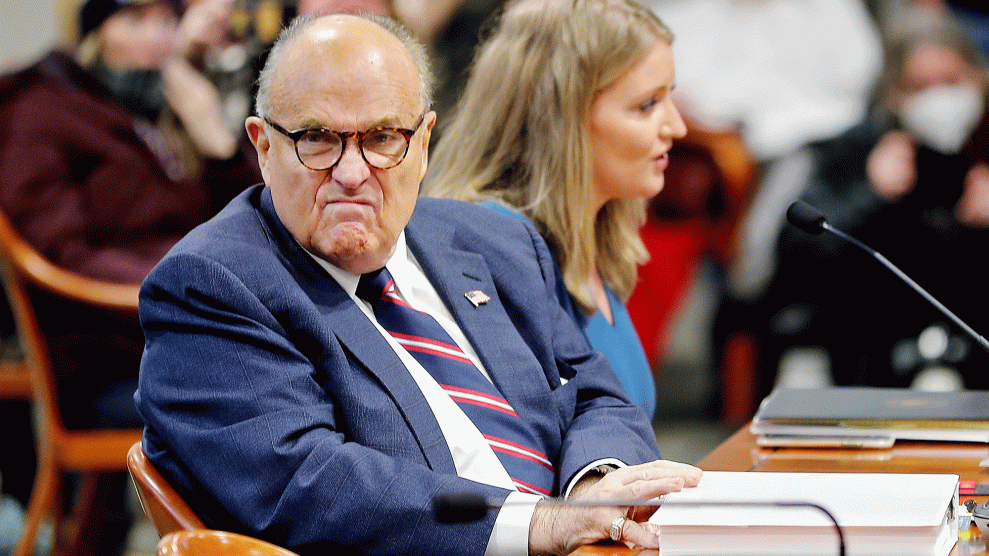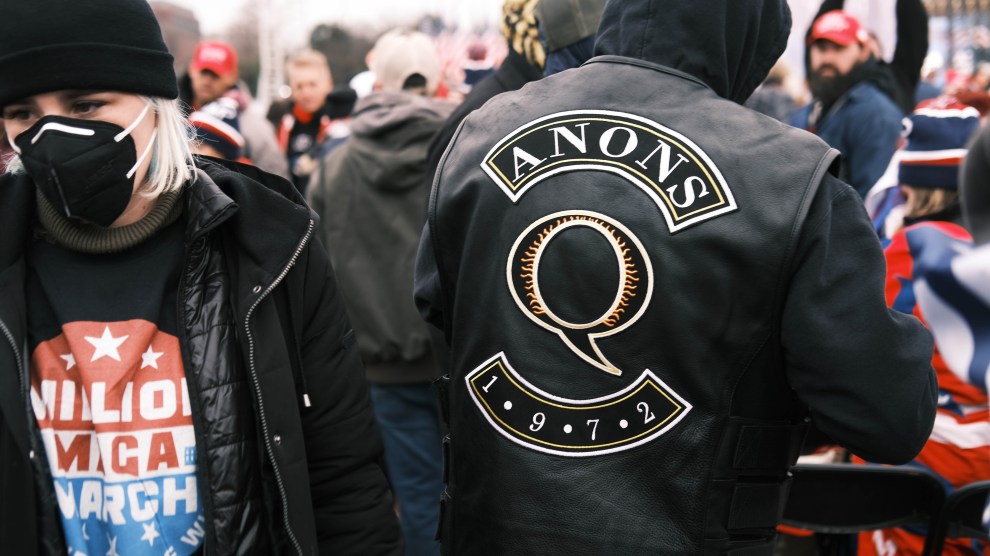
Mike Mulholland/AP
On December 14, Rudy Giuliani Zoomed into a Missouri legislative hearing. His testimony was part of his endless roadshow to overturn the election, and, as he has done so often in recent weeks, he once again insisted there was massive fraud in the presidential contest. Yet what made this appearance notable is that this time Donald Trump’s personal lawyer may have committed perjury.
Giuliani had been invited by Missouri Republicans to bring Trump’s anti-democracy crusade into a Jefferson City committee room, even though Missouri is not one of the swing states that Trump and his allies claim to have been part of the anti-Trump voting-fraud plot. (Trump handily won in Missouri.) But GOP members of the state House of Representatives, in a show of fealty to the defeated Trump, were pushing a non-binding resolution declaring that they have “no faith” in election results in Pennsylvania, Wisconsin, Michigan, Georgia, Arizona, and Nevada. And Giuliani was their star witness.
Earlier this year, the Republicans who control this legislative chamber revised the witness form that a person must sign before providing testimony and added wording that amounts to an oath. The witness must affirm that his or her testimony “is true and correct.” And the form states, “A witness who provides false testimony may be subject to criminal prosecution for perjury or other offenses, or contempt proceedings pursuant to Article III, Section 18, of the Missouri Constitution.” During this particular hearing, which was held by the Missouri House Special Committee on Government Oversight, Giuliani acknowledged that he had signed the form. That meant he could face criminal charges, if he provided false testimony.
And Giuliani arguably provided false testimony. Several times.
The former New York City mayor repeatedly asserted that Trump’s allegations of fraud deserved a hearing. He claimed that none of the scores of court challenges that Trump and his allies have lost ever included the opportunity to present allegations of fraud. All these defeats, he testified, were due to technical legal issues, such as standing. “The concern was there’s been no court case, there’s been no court determination of widespread fraud,” Giuliani said. “The reality is there’s been really no court case that’s heard any of these allegations.” He added that “every single case that’s been brought” was decided on procedural grounds. Asked if any of the cases filed on behalf of Trump were decided on the merits, Giuliani stated, “There’s been no case that’s been decided on the merits at all.”
But days earlier, in Wisconsin, a Trump-appointed federal judge named Brett Ludwig tossed out a suit filed by Trump that asked for the state’s results to be thrown out. Ludwig ruled that Trump had standing to file the case but that his legal arguments “fail on their merits.” He wrote, “This is an extraordinary case. A sitting president who did not prevail in his bid for reelection has asked for federal court help in setting aside the popular vote based on disputed issues of election administration, issues he plainly could have raised before the vote occurred. This Court has allowed plaintiff the chance to make his case and he has lost on the merits.”
In a Nevada case filed by Trump electors that sought to negate the state’s election, state judge James Russell considered multiple allegations of voter fraud, and he ruled on December 4, “Contestants did not prove under any standard of proof that illegal votes were cast and counted, or legal votes were not counted at all, due to voter fraud.” A case filed by Trump allies in Michigan last month met a similar fate. Wayne County Circuit Judge Timothy Kenny denied the plaintiffs their request to halt the certification of election results after assessing affidavits filed by people who claimed to have witnessed fraud. He concluded that their “interpretation of events is incorrect and not credible.”
So contrary to Giuliani’s assertion, several courts have considered the merits, examining allegations of fraud or illegal votes and tossing them aside. By the way, in a case argued by Giuliani in Pennsylvania, a federal appellate panel denied the Trump campaign’s request to block the certification of the vote in that state. Trump-appointed Judge Stephanos Bibas, who authored the opinion for the panel, wrote, “Free, fair elections are the lifeblood of our democracy. Charges of unfairness are serious. But calling an election unfair does not make it so. Charges require specific allegations and then proof. We have neither here.”
In front of the Missouri state lawmakers, Giuliani also presented fraud allegations that had been debunked. He testified that in Pennsylvania, hundreds of thousands of phony mail-in ballots were counted. Giuliani claimed that the state sent out 1.8 million mail-in ballots. He said that 1.4 million of these ballots were returned, yet 2.7 million mail-in ballots were ultimately counted. He suggested that hundreds of thousands of these ballots were “driven from Bethpage, New York, to a field in Pennsylvania a day or two before the election.”
The source of the Bethpage conspiracy theory is a Pennsylvania man with a criminal record and a history of drug abuse, mental health issues, and domestic violence allegations. But on the larger point of the number of mail-in ballots, Giuliani’s figures were false and way off—and this claim of phantom mail-in ballots had earlier been debunked. The 1.8 million-number applied to mail-in ballots Pennsylvania had sent out for the state’s June 2020 primary. An October 27 press release issued by the Pennsylvania Gov. Tom Wolfe stated that more than 3 million Pennsylvanians had requested mail-in ballots for the November election. And according to the Pennsylvania Department of State, nearly 2.6 million Pennsylvanians voted by mail. There was no dump of mysterious ballots. Giuliani was pushing disinformation that had been disproven before this hearing.
He did the same with another favorite tale cited by Trump and others endeavoring to undo the election. Through his testimony, Giuliani referred to an Election Night video recording of vote-counting employees in Fulton County, Georgia, as proof of fraud. He maintained this footage “shows demonstrably the theft of about 40,000 ballots in front of your eyes.” It does not.
Trump and his comrades have claimed this security-camera video caught election workers waiting for inspectors to leave and then stuffing ballots that were in suitcases hidden under a table. That’s false. As the Washington Post “Factchecker” column noted—a week prior to Giuliani’s testimony—“The surveillance video, which comprises four security camera feeds, shows no irregularities, illegal behavior or evidence of malfeasance on behalf of poll workers. The supposed ‘suitcases’ have been repeatedly identified by election officials as the standard boxes used in Fulton County to transport and store ballots. The video also fails to show any act of hiding or obscuring any ballots or election materials.” Georgia officials have found no wrongdoing related to this video. The “Factchecker” awarded this claim its top rating of “Four Pinocchios.”
Yet there was Giuliani, who had vowed by signing the witness form to present information that was “true and correct,” pushing a discredited and false story. At one point in the hearing, state Rep. Peter Merideth, a Democrat, confronted Giuliani and asked him why various Republicans—secretaries of state, state legislators, Attorney General Bill Barr—had all affirmed the vote count or challenged Trump’s allegations of fraud. “Are all these Republicans lying?” Merideth asked Giuliani. “Are they complicit. Are they incompetent?” In response, Giuliani said, “I’d ask you to calm down and take a look at the video tape from Fulton County.” He added, “It shows you quite clearly 40,000 votes being stolen.”
During the hearing, Giuliani raised other points of questionable accuracy. He referred to conspiratorial allegations about Dominion Voting Systems that have been denied by the company. And toward the end of the session, Giuliani pleaded with the Missouri legislators to “listen to Mrs. [Melissa] Carone who tells you a hundred thousand ballots were brought in in the middle of the night” at a Detroit vote-counting center. Giuliani was referring to the woman he had testified with in Michigan whose odd appearance became the target of a Saturday Night Live parody. More important, Michigan judge Kenny did evaluate Carone’s allegations and concluded they “simply are not credible.”
Ever since the election, Giuliani has been the chief crusader for Trump, pushing baseless and false accusations of widespread voter fraud. He has become Trump’s Roy Cohn, and it has seemed he is willing to echo almost any allegation or conspiracy theory cooked up to bolster Trump’s attempt to nullify an election and retain power. In venues across the country, he has spread disinformation. But his appearance before the Missouri House committee was different: He signed a statement pledging to tell the truth. Testifying falsely would be a crime, and under the state’s constitution a person convicted of lying to the legislature could be subject to a fine of $500 and 10 days in jail.
Mother Jones contacted Robert Costello, an attorney for Giuliani, and asked if Giuliani would care to comment regarding the accuracy of his Missouri testimony and the witness form he signed. “This conversation is a waste of our time,” Costello said. “I”m not going to ask him to respond.” Giuliani did not respond to a text requesting comment.
It is unlikely that Trump’s consigliere will wind up in the hoosegow because of his Missouri testimony. But if legislators there take seriously the oath on the witness form, they certainly have enough material to kick off an investigation of the president’s mouthpiece.


















